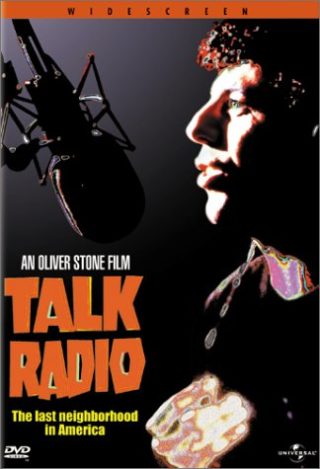 We watched Talk Radio tonight, as a kind of rom-com palate-cleanser. It’s one of my all-time favorite films, but it is every bit a maledy, and I’ve been avoiding maledies.
We watched Talk Radio tonight, as a kind of rom-com palate-cleanser. It’s one of my all-time favorite films, but it is every bit a maledy, and I’ve been avoiding maledies.
Still. Wow. Always. The second act is weak, but the third act kills and kills and kills. Eric Bogosian has never done better. Oliver Stone has never done better. Even Alec Baldwin puts in a great performance. Every small choice in this film is perfect, all the way down to the titles’ typography.
I first saw it on HBO, soon after it was made. I taped it off the television to watch again and again, later acquiring it on VHS tape, later still at least twice on DVD. I have a copy of Bogosian’s original playscript. And, doubt me nothing, “I could name you every duck in Turtle Creek!” The movie is Greek like nothing written today is Greek:
This is me writing about Talk Radio on the order of twenty years ago:
I like brutal art – no mercy, no quarter. I like any sort of brutality on the part of the artist, by which I mean the refusal to temporize or euphemize or in any other way permit the audience to gloss over or ignore reality. Understand, I don’t seek a gratuitous squalor, but rather an unforgiving acknowledgment that reality is what it is. This is what I love so much in the plays of Henrik Ibsen, who gives me ambiguous or tragic endings and teaches me more about real life than a dozen treatises.
All that is by way of introduction to a recommendation: The film Talk Radio by Oliver Stone and Eric Bogosian. It’s the most amazingly brutal film I’ve ever seen, absolutely no let-up from start to finish. I have Bogosian’s original playscript, but the film screenplay is substantially richer. Moreover, Stone’s camera tricks are superb; the film plays huge implication games with reflections, focus-shifting, facial reactions, etc. Similarly, Stewart Copeland (of The Police) provides a deeply disturbing score. Finally, the actors – especially Bogosian as radio talk show host Barry Champlain – are outstanding.
The film is “based on a true story,” the last days of Denver talk radio host Alan Berg, as documented in the book Talked to Death by Stephen Singular. But “true stories” are omnipresent and banal, where art is the thing that won’t turn you loose. I defy anyone to even breathe in Act III of Talk Radio. The film builds and builds until the tension is so immense it envelopes the room. And then, just when you can’t stand it, Stone and Bogosian throw the most horrifyingly perfect five minutes of agony right in your face, and you sweat and the tendons in your neck pop and you strain and you strain and you strain, desperate to turn away. But you can’t turn away, you can’t stand what you’re seeing and you can’t bear to miss a second of it.
Hedda Gabler, always, and Ghosts, and the fourth and fifth acts of Hamlet. I can think of more examples, but not many more. Great art says, “Your ass is mine.” Great art doesn’t have this quality or that quality. Great art takes over your mind and releases it only when it is through with you. This is the quality that permeates Ibsen; you must know precisely what you cannot bear to know. And this is the quality that informs Talk Radio, the most Ibsen-like, Greek-like drama ever committed to film.
By now Talk Radio is all but forgotten. Means nothing. Art in America is such a vacuum that nothing has come along since 1988 to supplant this film in my mind. None of that matters, nor does any of the rest of Bogosian’s corpus – or Stone’s. Buy or rent Talk Radio. This film is one of the singular artistic achievements of the twentieth century – in its writing, acting and directing an incomparable testament to the power of filmmaking as an artform.















